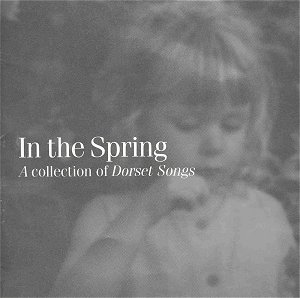It
is a healthy strand in the diverse CD market that artists can
more easily produce their own discs. Marketing may not be so straightforward
with distributors and retailers glutted with product from majors
and not-so-majors. This is where a site such as CMOTW can come
into its own and of course email and internet can help spread
the word.
This
disc of the singing of William Adams was not intended for full
commercial traffic. Rather it was to be sold at his recitals and
to friends and through Dorset outlets. The ten songs leave you
wishing that Adams had managed to find other rare Dorset treasures
but perhaps it is as well to be left wanting more ...
Adams
has dug deep into the broad Dorset lode and has come up with Hardy
settings as well as lesser known or completely unknown songs by
Coaker and Arkwright. The latter had two William Barnes settings
published in 1906. Coaker, who set many Barnes poems, was blind.
Paul Edmunds' Barnes song, The Bells of Alderburnham, was
written in the 1920s.
In
John Ireland's ringing and sprightly Great Things Adams
voice leaps forward confidently with strength and he imaginatively
colours and characterises candlelit dances on Dorset greens. Sustained
higher notes betray some strain but otherwise this singer, brought
up in the villages around Dorchester and Weymouth, is admirably
sturdy. He is, I think, too quick over Linden Lea which
would have benefited from more sensitivity. I have found many
of the Peel settings rather unimaginative but Bright is the
ring of words was new to me and Adams makes a good advocate
for the hymnal shape of the melody. Peel's Requiem is oaken
but rather plodding.His setting of In Summertime on Bredon
is memorable and has some fine moments but time and again
Peel misses opportunities for subtle word painting. Peel's The
Oxen is rather dirge-like. Arkwright's In the spring has
a Mozartian piano accompaniment and otherwise does not stir the
waters. On the other hand The Bells of Alderburnham is
a fine song. This is a real find with plenty of opportunities
taken for imaginative treatment and psychological colouring. More
Edmunds please. The Sergeant's Song is better known in
the Finzi setting rather than this Holst effort. It is rather
stolid by comparison with the Finzi but Adams has fun with some
gaunt humour on the words '... and maids won't wed for modesty'
building in a chuckle that works well. Barnes's poems are often
larded with Dorset dialect words. The Geate a-Vallen To (misspelt
on the CD itself) is dense with such words so a set of definitions
would have helped. Coaker produces a good tune - a bit like Shenandoah.
The
words and background are printed on the insert albeit white on
silvery grey. The issue of legibility aside the inset is most
beautifully and aptly designed.
Adams's
thickly oaken voice is startlingly closely recorded; as is the
piano. I am not sure that his voice is always athletic enough
for every one of these songs although it usually works very well
indeed. I have no argument with the use of colouration in his
voice. This is done with intelligence to underpin psychology and
meaning.
You
may be interested to know that Jim Pattison's Dunelm company has
recorded the baritone Stephen Foulkes in 'Songs of Dorset' - a
full CD of songs by Finzi, RVW, Holst, Clive Carey and Somervell
(DRD0186). Once again Barnes and Hardy are among the poets set.
That disc neatly complements the present one.
Adams
has a take it or leave it voice and if you accept it then you
will assuredly find much to enjoy here.
Rob
Barnett
